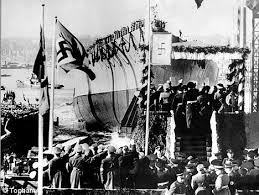Eighty years ago, Nazi Germany flags the continuity from one Reich to another, a Papal doubter of Nazism dies and a British bureaucratic tolerator of it rises further
In brilliant sunshine (“Hitler
weather”) Germany’s largest battleship ever was launched by Hitler in the
company of the entire leadership of the country. The Bismarck was named after the founder of the Second Reich and
clearly intended to emphasise the continuity of the two Reichs and to extend the reach of the Third. The intervening Weimar Republic could be skated over in silence. She was christened by
the Iron Chancellor’s grand-daughter Dorothee von Löwenfeld. Her displacement supposedly
respected the (by then obsolete) treaty limit of 35,000 tons but in reality
exceeded it by a wide margin. There was a moment of concern during the ceremony
when she initially failed to move down the slipway as the chocks were knocked
away but she did. Some brave souls (probably mainly foreign journalists)
allowed themselves the joke that the notoriously bulky Herman Goering had been
obliged to give her a push to get her going.
Pope Pius XI died at the age of
81. His papacy had begun in early 1922 and he had the difficult task of
steering the Catholic church through the age of Fascist dictatorships. He had
signed concordats with both Nazi Germany and Fascist Italy. By 1937 he had
become so affronted by Nazi breaches of the Concordat that he published in Germany
under conditions of great secrecy the encyclical Mit Brennende Sorge denouncing these breaches. In the last weeks of
his life had drafted an encyclical in response
to the Nazi Crystal Night pogrom Humani generis unitas (The Unity of
the Human Race) denouncing racism. It was never published.
It was officially announced that
Sir Horace Wilson would succeed Sir Warren Fisher as Official Head of the
British Civil Service when Fisher retired in October at the normal age of 60.
In practice this formalised the position that had held good since Chamberlain
took over from Stanley Baldwin as Prime Minister in 1937. Wilson was Chamberlain’s
intimate adviser and confidant. He had far overtaken Fisher, who had been
instrumental in getting him the job at 10 Downing Street in 1935, in terms of
real power. Wilson ruled the Civil Service with a rod of iron, meting out
punishment to anyone who failed to support the policy of appeasement. Fisher had
protested strongly but privately at the abandonment of Czechoslovakia the
previous autumn which made his position more or less untenable. Fisher awarded
himself six months pre-retirement leave so the handover actually occurred
faster. Wilson kept the small office next to the Cabinet Room at Downing Street
which was the true locus of his power and shuttled between it and the far more
imposing office in the Treasury.



Comments
Post a Comment